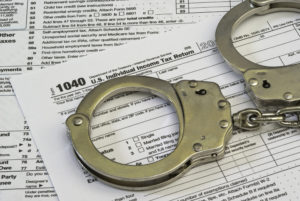Tax evasion is a phrase that is often used to describe a wide variety of tax-related violations. In the world of tax administration/enforcement, however, it has a specific statutory meaning. It has been the charge of choice in a number of high-profile cases throughout history—from the convictions of Al Capone to Leona Helmsley to Wesley Snipes. With IRS estimates indicating that the annual tax gap exceeds $450 billion, tax evasion, which makes up a substantial portion of that figure, costs the federal government billions every year.
Section 7201 of the Internal Revenue Code criminalizes tax evasion. That section provides that:
Any person who willfully attempts in any manner to evade or defeat any tax imposed by this title or the payment thereof shall, in addition to other penalties provided by law, be guilty of a felony and, upon conviction thereof, shall be fined not more than $100,000 ($500,000 in the case of a corporation), or imprisoned not more than 5 years, or both, together with the costs of prosecution.
Section 7201 thus criminalizes two separate events: (a) the willful attempt to evade or defeat the assessment of a tax and (b) the willful attempt to evade or defeat the payment of a tax.
The Elements
In order to prove tax evasion, the government is required to prove the existence of the following three elements beyond a reasonable doubt:
- An affirmative act that constitutes an attempt to evade or defeat a tax or the payment thereof;
- An additional tax due and owing;
- Willfulness.
The Affirmative Act Requirement
In order to violate Section 7201, the taxpayer generally must take some affirmative action with an intent to evade tax. For these purposes, an affirmative act is construed rather broadly: Courts generally find that “any conduct, the likely effect of which would be to mislead or to conceal” is sufficient to constitute an affirmative attempt to evade tax. United States v. Spies, 317 U.S. at 499. Even an act that would otherwise be perfectly legal can satisfy the affirmative-act element if the government can demonstrate that it was committed with the intent to evade tax. This is often established, for example, by showing that the taxpayer hid assets, made false statements to IRS agents, or filed a false tax return.
Tax Evasion Investigations
Tax evasion charges are generally investigated by the IRS Criminal Investigation Division (“CID”), and can come with serious consequences. CID employs sophisticated investigatory procedures to build its case—a process that often takes many months or years. Tax evasion investigations can arise out of a number of different contexts, from standard civil audits, to disgruntled former employees through the whistleblower program, and even out of other investigations, among other things. Those facing potential tax evasion charges should seek out competent legal counsel to explore their potential exposure and defenses. For proactive taxpayers, there are often options available to mitigate criminal exposure. For related topics, see our prior posts on The Badges of Fraud and The Cheek Defense to Federal Tax Crimes.
White Collar Defense Attorneys
Freeman Law represents companies, executives, and individuals in regulatory and white-collar government investigations and prosecutions. We employ a proactive approach to defend vigorously and strategically position our clients. White-collar matters often involve parallel regulatory and civil proceedings. Freeman Law can navigate the complexities and collateral consequences of multiple proceedings. And when it comes to the court of public opinion, we employ ethical and strategic tactics to manage publicity. Schedule a consultation or call (214) 984-3410 to discuss your allegations and investigations concerns.

